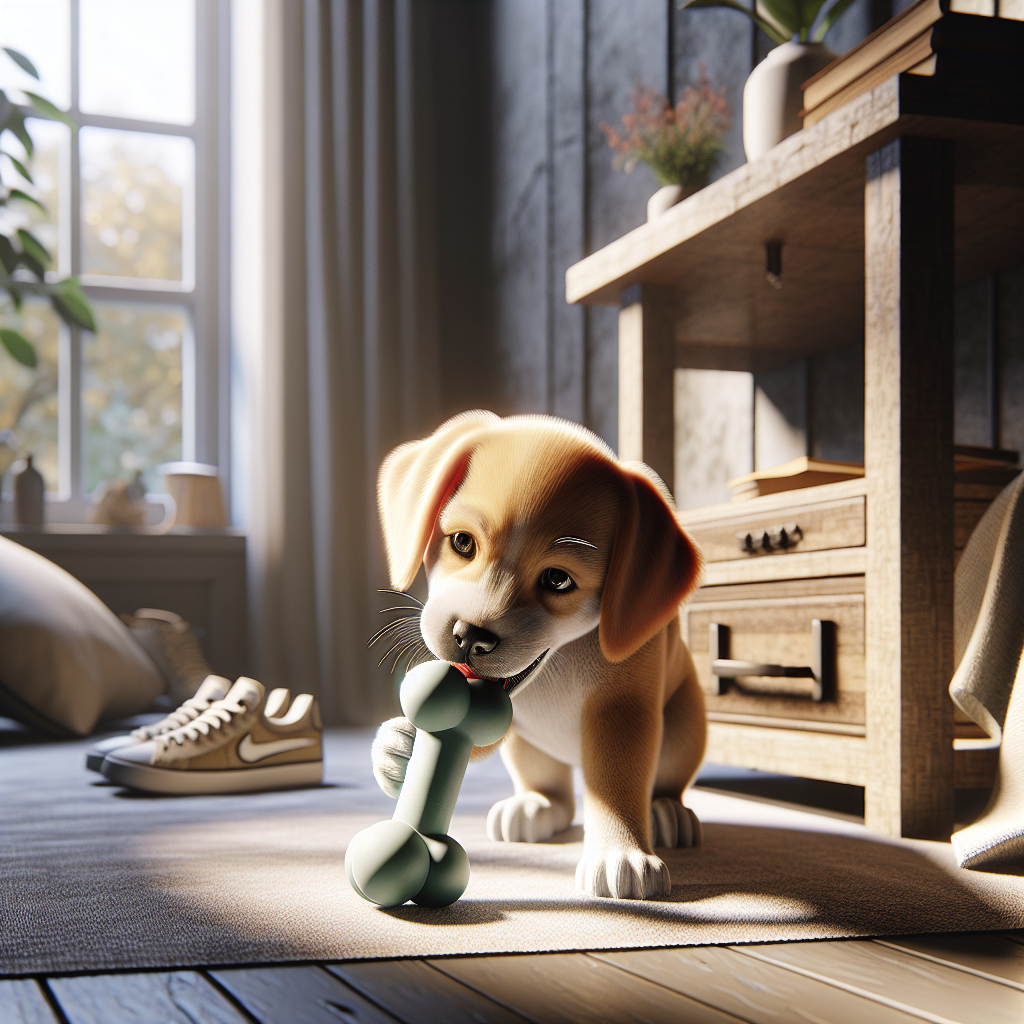
Por que los cachorros muerden las cosas

Puppies are naturally curious creatures, and their exploration of the world often involves using their mouths. Munching on furniture, toys, and even our hands is a common behavior seen in young dogs. This tendency to chew and bite is not just a phase; it serves several essential purposes in a puppy's development. Understanding why puppies engage in this behavior can help owners manage it effectively and ensure a happy and healthy upbringing for their furry friends.
One of the primary reasons puppies bite and chew on objects is teething. Just like human babies, puppies experience discomfort when their teeth are coming in. Chewing can provide relief from this pain and help them navigate their new dental landscape. Additionally, mouthing is a way for puppies to interact with their environment and learn about their surroundings. By recognizing these motivations, dog owners can create a more suitable environment that caters to their puppies' needs while minimizing unwanted chewing behaviors.
- Why Do Puppies Chew Everything? Understanding Their Behavior
- The Importance of Teething in Puppies: What You Need to Know
- How to Discourage Excessive Chewing in Puppies
- Safe Chew Toys for Puppies: A Guide for Pet Owners
- Signs Your Puppy is Bored and Needs More Stimulation
- Training Tips to Prevent Destructive Chewing in Puppies
Why Do Puppies Chew Everything? Understanding Their Behavior
Puppies have an innate tendency to chew on a variety of objects, and this behavior is completely normal. One of the primary reasons for this is that chewing helps relieve teething discomfort. Just like human babies, puppies go through a teething phase where their gums are sore and they need something to gnaw on. Chewing provides them with a sense of relief and helps to soothe the pain associated with their incoming adult teeth.
Beyond teething, puppies are naturally curious creatures. They explore their environment largely through their mouths, which means that everything can become a target for their chewing habit. This exploration helps them learn about their surroundings, and it's essential for their cognitive development. As such, it’s crucial for puppy owners to provide appropriate toys and items that satisfy their curiosity and need to chew.
Moreover, chewing can also be a way for puppies to manage their energy levels. High-energy breeds especially may resort to chewing when they are bored or anxious. Engaging in consistent play and exercise can mitigate this behavior, as a well-exercised puppy is less likely to chew on household items. Thus, establishing a routine that includes physical and mental stimulation is vital for curbing unwanted chewing.
Lastly, it's important to recognize that some puppies may chew as a form of stress relief. Changes in their environment, separation anxiety, or even lack of socialization can lead them to chew more intensely. Providing a safe and stable environment, along with appropriate training, can help alleviate these stressors and reduce the urge to chew on inappropriate items.
The Importance of Teething in Puppies: What You Need to Know
Teething is a critical phase in a puppy's development, typically occurring between three and six months of age. During this time, puppies experience discomfort as their baby teeth fall out and adult teeth emerge. Understanding the significance of this process can help pet owners provide the necessary care and support for their furry friends. It's essential to recognize that biting and chewing during teething are natural behaviors that help alleviate discomfort.
As puppies teethe, they often seek relief by chewing on various objects. This behavior not only aids in soothing their gums but also allows them to explore their environment. To manage this teething phase effectively, consider the following strategies:
- Provide appropriate chew toys: Invest in safe and durable toys designed for teething puppies.
- Encourage positive chewing: Redirect your puppy's attention to acceptable items whenever they start chewing on furniture or shoes.
- Use freezing techniques: Consider freezing wet washcloths or rubber toys to provide soothing relief to their gums.
It's also important to monitor your puppy's chewing habits. Some puppies may accidentally swallow non-food items, which can lead to serious health issues. By understanding the teething process and implementing preventive measures, you can help ensure a smoother transition into adulthood.
In summary, teething is a vital part of a puppy's growth that can bring both challenges and opportunities for bonding. By being proactive and providing appropriate outlets for their chewing instincts, you can help your puppy navigate this stage with ease, ensuring they develop into a well-adjusted adult dog.
How to Discourage Excessive Chewing in Puppies
Discouraging excessive chewing in puppies requires a combination of training, redirection, and providing appropriate outlets for their natural behaviors. First, it's crucial to identify the triggers that lead to excessive chewing. Common triggers include boredom, anxiety, or the need for teething relief. By understanding what prompts your puppy to chew, you can take more effective steps to manage the behavior.
One effective method is to redirect your puppy's chewing to suitable toys. Providing a variety of chew toys can help satisfy their urge to chew while keeping them away from household items. Consider offering toys made of different materials, such as rubber, rope, or soft fabric. You can also use toys that are flavored or stuffed to make them more enticing. Here are some suggestions:
- Durable rubber toys
- Rope toys for tugging
- Stuffed toys with treats inside
- Teething toys specifically designed for puppies
Additionally, establishing a routine that includes regular playtime and exercise can greatly reduce boredom and anxiety, two common reasons for excessive chewing. Make sure to engage in daily activities that stimulate your puppy both physically and mentally. Training sessions, socialization with other dogs, and interactive games can help keep their minds occupied and reduce unwanted chewing.
Finally, it's essential to consistently reinforce positive behavior. Whenever your puppy chooses an appropriate item to chew, reward them with praise, treats, or affection. This positive reinforcement encourages your puppy to continue behaving well and helps build a stronger bond between you and your furry friend.
Safe Chew Toys for Puppies: A Guide for Pet Owners
Choosing the right chew toys for your puppy is essential for their health and development. Puppies have a natural instinct to chew, especially during their teething phase, which typically occurs between 3 to 6 months of age. Providing safe and appropriate toys not only satisfies their urge to chew but also helps to prevent destructive behavior around the house.
When selecting chew toys, keep in mind the following factors to ensure your puppy's safety and enjoyment:
- Material: Opt for durable materials such as rubber or nylon that can withstand aggressive chewing.
- Size: Choose toys that are appropriately sized for your puppy to prevent choking hazards.
- Non-toxic: Always look for toys that are labeled as non-toxic and free from harmful chemicals.
Some popular safe chew toy options include rubber toys, which can be filled with treats to keep your puppy engaged, and rope toys, which help clean teeth while providing a fun chewing experience. Additionally, consider natural chews like bully sticks or antlers, but supervise your puppy to avoid any swallowing hazards.
Always monitor your puppy while they play with chew toys and regularly inspect the toys for any signs of wear and tear. If a toy becomes damaged, it’s best to replace it to ensure your puppy remains safe. With the right chew toys, you can help your puppy develop healthy chewing habits while keeping your belongings safe from their enthusiastic little teeth!
Signs Your Puppy is Bored and Needs More Stimulation
Understanding the signs that your puppy is bored is essential for their well-being and development. Puppies, being naturally curious and energetic, require ample mental and physical stimulation to thrive. If you notice your puppy exhibiting certain behaviors, it may be an indication that they are feeling bored and in need of more engagement.
Common signs that your puppy is experiencing boredom include:
- Destructive behavior: If your puppy is chewing on furniture, shoes, or other household items, it may be a sign that they need more appropriate outlets for their energy.
- Excessive barking: A bored puppy might bark more than usual, seeking attention or trying to entertain themselves.
- Lethargy: If your puppy seems less active or interested in play, it could be a sign that they are not getting enough mental stimulation.
- Restlessness: Watch for pacing or difficulty settling down. This behavior often indicates that they need more physical activity or mental challenges.
To combat boredom, it’s crucial to provide your puppy with various forms of stimulation. Engaging them in interactive play, offering puzzle toys, and ensuring regular exercise can significantly improve their mood and behavior. Remember, a well-stimulated puppy is a happy puppy!
Incorporating routine activities such as training sessions, socialization with other dogs, and exploring new environments can also aid in keeping your puppy engaged. By paying attention to these signs and addressing your puppy's needs, you can foster a healthier and more fulfilling relationship with your furry companion.
Training Tips to Prevent Destructive Chewing in Puppies
Preventing destructive chewing in puppies is essential for maintaining a harmonious home and ensuring your puppy's safety. One of the most effective methods is to provide appropriate chew toys. Choose toys that are durable and specifically designed for puppies. This not only satisfies their natural urge to chew but also keeps them away from household items. Regularly rotate these toys to maintain your puppy’s interest and excitement.
Consistent training is key to managing your puppy’s chewing behavior. Establish a routine that includes positive reinforcement when your puppy chews on the right items. Use treats, praise, or playtime as rewards. If your puppy begins to chew something inappropriate, calmly redirect them to their toys. Over time, they will learn what is acceptable and what is not.
Another helpful strategy is to create a designated play area for your puppy. This space should be filled with their toys and free from items you don’t want them to chew on. By limiting their access to certain areas of the house, you can significantly reduce the chances of destructive chewing. Additionally, consider using puppy-proofing measures, like gates or playpens, to manage their environment effectively.
Lastly, ensure that your puppy receives adequate physical and mental stimulation. Boredom can lead to chewing as a way to release pent-up energy. Engage your puppy in daily exercise, training sessions, and interactive games. This will help keep their minds active and reduce the likelihood of destructive behavior. Remember, a well-exercised puppy is generally a happier and more content puppy!
Si quieres conocer otros artículos parecidos a Por que los cachorros muerden las cosas puedes visitar la categoría Pruebas.
Deja un comentario





Relacionadas